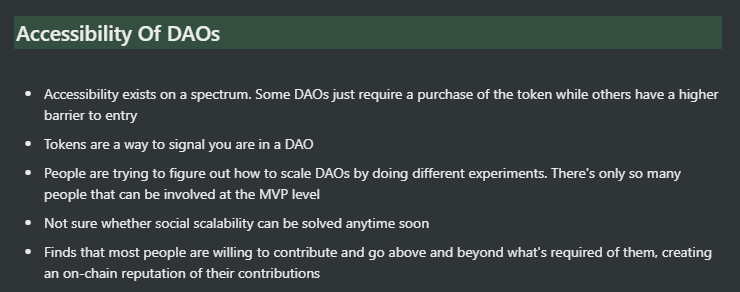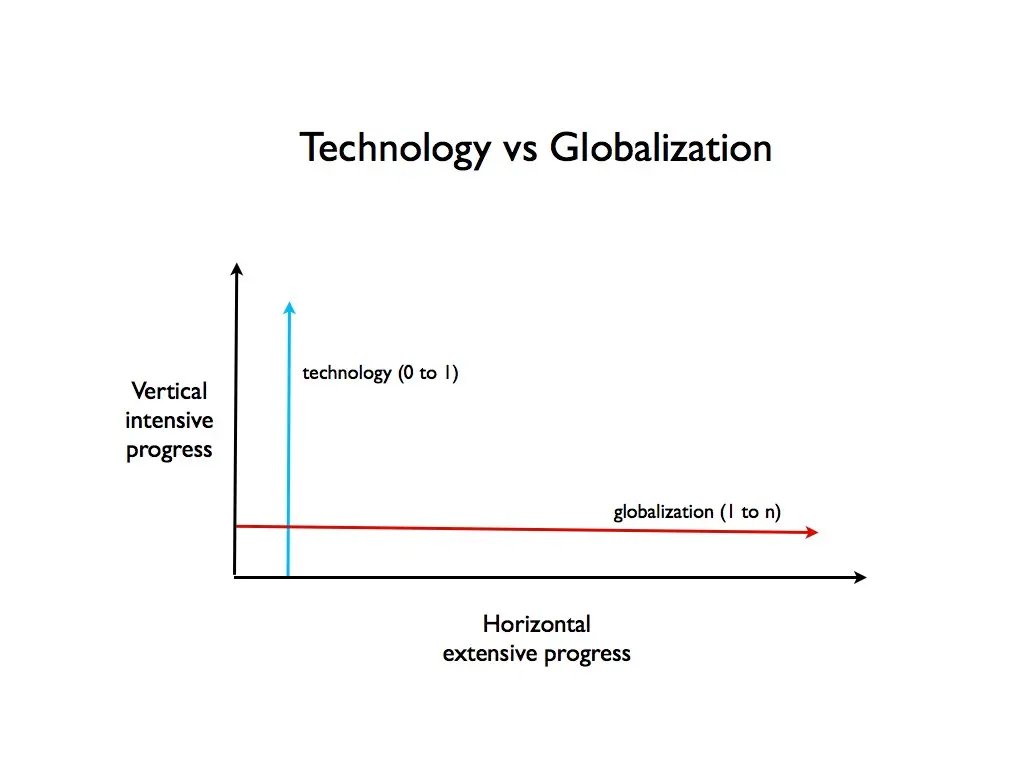Learn about DAOs from @_kinjalbshah in this episode of On The Other Side by @chaserchapman
There's plenty of insights to be gained here 💡👀👇
There's plenty of insights to be gained here 💡👀👇
@_kinjalbshah @chaserchapman Background
🔹 Joined the space 4 years ago when she was with @Fidelity
🔹 Had to figure out which use cases to be prioritized
🔹 Fell in love with the ecosystem
🔹 Joined @blockchaincap
🔹 Co-Founded @KomorebiFund, a DAO focused on investing in female & non-binary founders
🔹 Joined the space 4 years ago when she was with @Fidelity
🔹 Had to figure out which use cases to be prioritized
🔹 Fell in love with the ecosystem
🔹 Joined @blockchaincap
🔹 Co-Founded @KomorebiFund, a DAO focused on investing in female & non-binary founders

@_kinjalbshah @chaserchapman @Fidelity @blockchaincap @KomorebiFund The next 5 years
🔹 Bucket it into 2 categories:
1️⃣ What can people do with NFTs?
2️⃣ DAO landscape
🔹 Unsure whether DAOs will go mainstream
🔹 DAOs are opt-in communities; you get what you put in
🔹 Trend is to have 1000s of small communities
🔹 DAO onboarding is ⬆️ challenging
🔹 Bucket it into 2 categories:
1️⃣ What can people do with NFTs?
2️⃣ DAO landscape
🔹 Unsure whether DAOs will go mainstream
🔹 DAOs are opt-in communities; you get what you put in
🔹 Trend is to have 1000s of small communities
🔹 DAO onboarding is ⬆️ challenging

@_kinjalbshah @chaserchapman @Fidelity @blockchaincap @KomorebiFund Accessibility of DAOs
🔹 Accessibility exists on a spectrum. Some DAOs just require a purchase of the token while others have a higher barrier to entry
🔹 Trying to figure out how to scale DAOs by doing experiments 🧑🔬
🔹 Unsure whether social scalability can be solved soon
🔹 Accessibility exists on a spectrum. Some DAOs just require a purchase of the token while others have a higher barrier to entry
🔹 Trying to figure out how to scale DAOs by doing experiments 🧑🔬
🔹 Unsure whether social scalability can be solved soon

@_kinjalbshah @chaserchapman @Fidelity @blockchaincap @KomorebiFund Feasibility of on-chain reputation
🔹 50 years ago, career reputation was based on your resume and ppl vouching for you
🔹 Today, freelancers have a portfolio of their contributions to various projects/DAOs
🔹 This reputation is carried along with them wherever they go
🔹 50 years ago, career reputation was based on your resume and ppl vouching for you
🔹 Today, freelancers have a portfolio of their contributions to various projects/DAOs
🔹 This reputation is carried along with them wherever they go

@_kinjalbshah @chaserchapman @Fidelity @blockchaincap @KomorebiFund Value creation
🔹 DAOs are thinking about monetizing content rather than putting it out for free
🔹 Wrote a piece with @Cooopahtroopa about tokens representing ownership of a community
🔹 When people contribute to DAOs, they are helping the value of the community go up
🔹 DAOs are thinking about monetizing content rather than putting it out for free
🔹 Wrote a piece with @Cooopahtroopa about tokens representing ownership of a community
🔹 When people contribute to DAOs, they are helping the value of the community go up

@_kinjalbshah @chaserchapman @Fidelity @blockchaincap @KomorebiFund @Cooopahtroopa On Micro-Economies
🔹 Wrote a piece with Cooper Turley about the Rise of Micro-economies
🔹 Popular concept from early 2000s where the internet enables a 1000 true fans that can create a sustainable biz for one person 👨👩👦👦
🔹 Fans feel attachment to a given cause or mission
🔹 Wrote a piece with Cooper Turley about the Rise of Micro-economies
🔹 Popular concept from early 2000s where the internet enables a 1000 true fans that can create a sustainable biz for one person 👨👩👦👦
🔹 Fans feel attachment to a given cause or mission

@_kinjalbshah @chaserchapman @Fidelity @blockchaincap @KomorebiFund @Cooopahtroopa 🔹 Starting to see such small communities scale when it comes to value creation
🔹 Instead of organizing around geography or a LLC, people are organizing around a digital state/city where anybody can participate in 👨👩👦👦🌍
🔹 Instead of organizing around geography or a LLC, people are organizing around a digital state/city where anybody can participate in 👨👩👦👦🌍
@_kinjalbshah @chaserchapman @Fidelity @blockchaincap @KomorebiFund @Cooopahtroopa Creator Middle Class
🔹 Idea that people want to become influencers
🔹 Only top 1% of them get to that point
🔹 The rest belongs to the Creator Middle Class
🔹 Evolving from wanting millions of followers to a small group of passionate followers
🔹 Idea that people want to become influencers
🔹 Only top 1% of them get to that point
🔹 The rest belongs to the Creator Middle Class
🔹 Evolving from wanting millions of followers to a small group of passionate followers

@_kinjalbshah @chaserchapman @Fidelity @blockchaincap @KomorebiFund @Cooopahtroopa Value of holding a token
🔹 Governance token price is determined by the market
🔹 Strong token = strong hodlers
🔹 Large DeFi DAOs have billions in treasuries
🔹 What is critical is having something to govern and a strong community with conviction in the DAO 💪
🔹 Governance token price is determined by the market
🔹 Strong token = strong hodlers
🔹 Large DeFi DAOs have billions in treasuries
🔹 What is critical is having something to govern and a strong community with conviction in the DAO 💪

@_kinjalbshah @chaserchapman @Fidelity @blockchaincap @KomorebiFund @Cooopahtroopa Differentiating btw Building & Governing
🔹 @kaiynne made a post differentiating the two
🔹 Kinjal offered a slightly different framework:
1️⃣ Financial health of a DAO
2️⃣ Social health of a DAO
🔹 Building products ➡️ financial health
🔹 Building community ➡️ social health
🔹 @kaiynne made a post differentiating the two
🔹 Kinjal offered a slightly different framework:
1️⃣ Financial health of a DAO
2️⃣ Social health of a DAO
🔹 Building products ➡️ financial health
🔹 Building community ➡️ social health

@_kinjalbshah @chaserchapman @Fidelity @blockchaincap @KomorebiFund @Cooopahtroopa @kaiynne 🔹 Doesn't think you can separate the two from each other
🔹 More like a funnel/hierarchy where everything is governance, but not everyone should be deciding everything in governance
🔹 Have to make sure to get the right person to make those decisions
🔹 More like a funnel/hierarchy where everything is governance, but not everyone should be deciding everything in governance
🔹 Have to make sure to get the right person to make those decisions
@_kinjalbshah @chaserchapman @Fidelity @blockchaincap @KomorebiFund @Cooopahtroopa @kaiynne Best Practices in DAOs
🔹 Different communities have different objectives, but still, there might be some standardization
🔹 Still in the experimental phase and we would not know what's coming in the future
🔹 Different communities have different objectives, but still, there might be some standardization
🔹 Still in the experimental phase and we would not know what's coming in the future

@_kinjalbshah @chaserchapman @Fidelity @blockchaincap @KomorebiFund @Cooopahtroopa @kaiynne Time horizon for DAO adoption
🔹 Hype curve ➡️ things slowing down ➡️ infrastructure gets built ➡️ rising back up again
🔹 Will differ across different types of DAOs
🔹 DeFi DAOs have reached a level of maturity
🔹 Expecting social tokens to be the next breakout category 👀
🔹 Hype curve ➡️ things slowing down ➡️ infrastructure gets built ➡️ rising back up again
🔹 Will differ across different types of DAOs
🔹 DeFi DAOs have reached a level of maturity
🔹 Expecting social tokens to be the next breakout category 👀

@_kinjalbshah @chaserchapman @Fidelity @blockchaincap @KomorebiFund @Cooopahtroopa @kaiynne Infrastructure
DAOs:
🔹 Big missing piece is a DIY DApp that can integrate the entire tech stack in 5 - 10 mins and allow the user to user a bundle of tools and services
🔹 Consolidating Discord, Telegram, Snapshot, and Discourse into one
DAOs:
🔹 Big missing piece is a DIY DApp that can integrate the entire tech stack in 5 - 10 mins and allow the user to user a bundle of tools and services
🔹 Consolidating Discord, Telegram, Snapshot, and Discourse into one

@_kinjalbshah @chaserchapman @Fidelity @blockchaincap @KomorebiFund @Cooopahtroopa @kaiynne NFTs:
🔹 A wallet that is super accessible
🔹 Progress is being made in this area, but there's still more infrastructure to come
🔹 On the backend, one has to ask:
1️⃣ Who is hosting the NFT?
2️⃣ Who is owning the IP?
3️⃣ What does the price history look like
🔹 A wallet that is super accessible
🔹 Progress is being made in this area, but there's still more infrastructure to come
🔹 On the backend, one has to ask:
1️⃣ Who is hosting the NFT?
2️⃣ Who is owning the IP?
3️⃣ What does the price history look like
@_kinjalbshah @chaserchapman @Fidelity @blockchaincap @KomorebiFund @Cooopahtroopa @kaiynne Onboarding more users or catering to crypto natives?
🔹 Many valid points of view. Heard from a few founders that they pick one path and then double down on it
🔹 Concerning the former, it's about making sure that users are not confused and can purchase things easily
🔹 Many valid points of view. Heard from a few founders that they pick one path and then double down on it
🔹 Concerning the former, it's about making sure that users are not confused and can purchase things easily

@_kinjalbshah @chaserchapman @Fidelity @blockchaincap @KomorebiFund @Cooopahtroopa @kaiynne 🔹 Concerning the latter, it is okay for your product to be more clunky or make your users jump through more hoops. The user is willing and excited to appreciate the nuances of what you are building in crypto
🔹 Both approaches are valid. Important to know which you are choosing
🔹 Both approaches are valid. Important to know which you are choosing
@_kinjalbshah @chaserchapman @Fidelity @blockchaincap @KomorebiFund @Cooopahtroopa @kaiynne Links
Substack post: thereadingape.substack.com/p/on-the-other…
Substack post: thereadingape.substack.com/p/on-the-other…
@_kinjalbshah @chaserchapman @Fidelity @blockchaincap @KomorebiFund @Cooopahtroopa @kaiynne Links
Podcast: open.spotify.com/episode/17uyCD…
Thanks to @chaserchapman for this insightful interview!
Podcast: open.spotify.com/episode/17uyCD…
Thanks to @chaserchapman for this insightful interview!
@_kinjalbshah @chaserchapman @Fidelity @blockchaincap @KomorebiFund @Cooopahtroopa @kaiynne Like our work?
✅Follow us
✅Subscribe to our substack
Apes alone weak 🦍💀
Apes together strong🦍🦍🦍💪💪💪
Stay strong, apes 🦍💪
~ End Thread
✅Follow us
✅Subscribe to our substack
Apes alone weak 🦍💀
Apes together strong🦍🦍🦍💪💪💪
Stay strong, apes 🦍💪
~ End Thread
• • •
Missing some Tweet in this thread? You can try to
force a refresh











